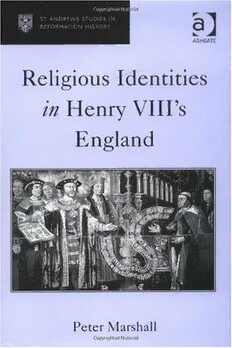
Religious Identities In Henry VIII's England PDF
307 Pages·2006·10.17 MB·English
Most books are stored in the elastic cloud where traffic is expensive. For this reason, we have a limit on daily download.
Preview Religious Identities In Henry VIII's England
Description:
Henry VIII's decision to declare himself supreme head of the church in England, and thereby set himself in opposition to the authority of the papacy, had momentous consequences for the country and his subjects. At a stroke people were forced to reconsider assumptions about their identity and loyalties, in rapidly shifting political and theological circumstances. Whilst many studies have investigated Catholic and Protestant identities during the reigns of Elizabeth and Mary, much less is understood about the processes of religious identity-formation during Henry's reign. In this volume Peter Marshall explores a wide range of evidence that underlines the complex web of overlapping and competing identities that people were forced to assume as a religiously conservative king sought to take control of his national church. Investigating broad issues of conversion, polemic and propaganda, scripture, exile, forgery and miracles, as well as looking at specific cases of individuals and events, a rich picture is built up of the ambiguities and paradoxes of the early reformation process in England. Consisting of three entirely new chapters, and eight previously published but updated, essays, this volume provides a fascinating insight into the complex religious developments of early sixteenth-century England. As Tudor religious history enters a 'post-revisionist' phase that acknowledges the strength and vitality of traditional religious culture, whilst reasserting the broad appeal of the evangelical message, this volume provides a timely reassessment and critique of the subject.
See more
The list of books you might like
Most books are stored in the elastic cloud where traffic is expensive. For this reason, we have a limit on daily download.
